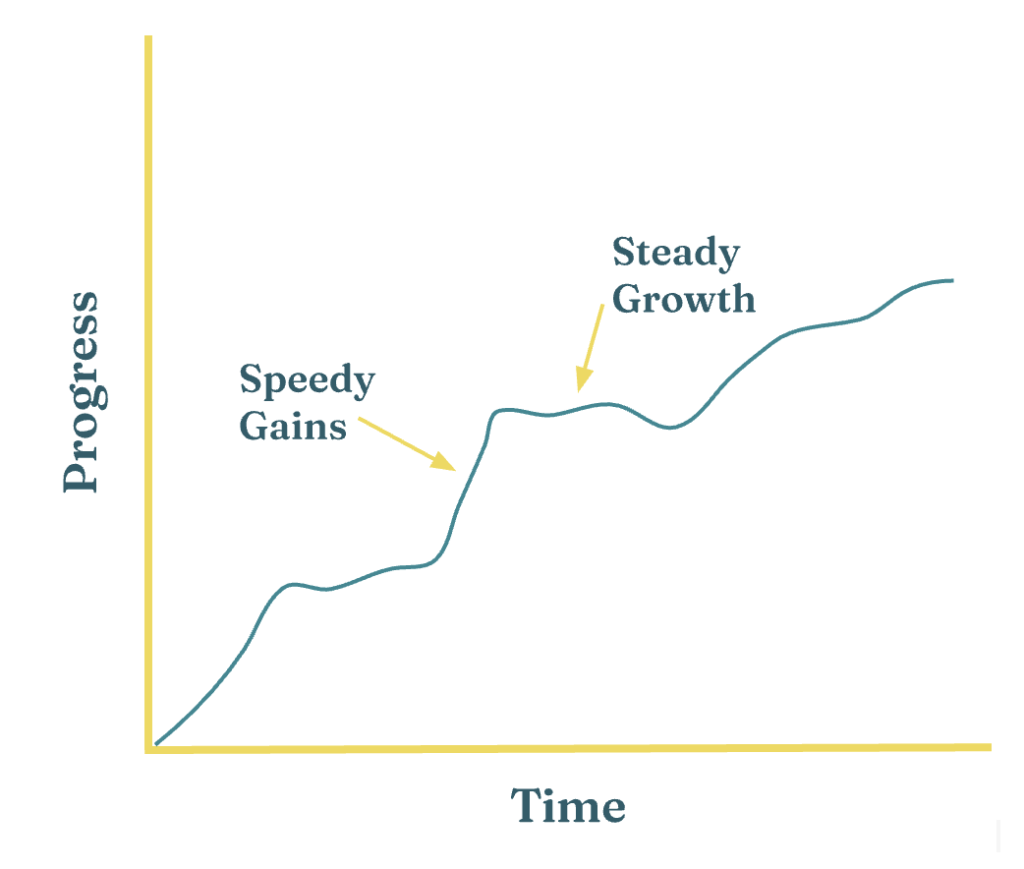Blog How To Learn A Language Podcast
March 18th, 2024
Rewards Or Threats? How to Find & Maintain Your Unique Motivation
Motivation is key to fluency. We need language learning motivation because it’s what drives us to keep going. But are you motivated by rewards or threats?

Before we begin…
The Video
The Podcast
How Does Motivation Work?
When it comes to language learning, the role of motivation can’t be understated. But it’s easy to get it wrong and mistake the wrong things as motivators.
We might feel overall motivated to learn a language, but not really be very excited by the prospect of the individual task in front of us that we’ve decided will help get us fluent.
Motivation ebbs and flows. It’s why there’s two key phases to language learning – Speedy Gains and Steady Growth. Knowing how to thrive in both phases (and how to transition confidently between the two) is crucial for long-lasting language learning motivation.

Speedy Gains is the phase we often find ourselves in at the start – the start of a new language, the start of a new month, the start of a new coursebook.
We’re excited, and that excitement fuels our motivation to dive in headfirst, do more, and make quite quick progress, hence the name Speedy Gains.
But then what happens is life gets in the way, we get stuck on an activity in the coursebook, or we feel bored and fall out of love with the language learning we’ve been doing so…we give up.
What’s needed in these moments is a phase of Steady Growth. This is where you’re doing a sustainable amount, it’s managable and enjoyable for a longer period of time, even if that progress isn’t as easy to notice.
The Steady Growth phase is essential to quickly and easily revive us into a phase of Speedy Gains when we get that next wave of motivation.
If we’ve given up on the other hand, it’s much harder to reconnect to that motivation we once had.
There’s of course, a lot more we could dig into on the topic of motivation, and we do inside the Motivation & Mindset Chapter in Language Life. But for today, we’re going to focus on one key factor in particular: are you motivated by reward or threat?
Motivated by Rewards
So, what makes us feel motivated? Some of us are motivated by by Rewards.
That means when there’s a task that we’re kinda meh about, if we have a reward of some kind lined up, we’re more motivated to do that task.
I’m not saying “Eat a chocolate bar every time you finish an exercise in the textbook! Woo!”
That’s not practical, and you’d soon get sick of the sight of chocolate, not good.
But if you find yourself motivated by Rewards, think about what would be a suitably motivating reward. For example, there’s a language task that you enjoy less than another. Let’s say grammar exercises for argument’s sake. You might plan to reward yourself for completing this by only letting yourself do a session on youir favourite language app AFTER you’ve completed the grammar exercise.
Rewards work as a motivator because it gives us positive association with the process of language learning, which is exactly what we want for maintained long-term language learning motivation.
Motivated by Threats
On the other hand, some of us don’t get as motivated by rewards, but rather by Threats.
And, again, no extremes here! I’m not implying that you’ll physically or mentally hurt yourself if you don’t do the grammar exercise. But there’s a negative consequence that is unappealing to you.
So Reward = positive consequence, and Threat = negative consequence.
You don’t want this to be something that impeeds your language learning. So nothing like “If I get less than 5 out of 10 on this exercise, I won’t do any Spanish for a whole week!” That’s rubbish.
But perhaps something like this would act as a motivation to do the thing…
If I don’t do this grammar test each day, then I have to pay my friend £1 for every day I miss.
I’m sure you love your firned, but not enough to pay them £1 every single day! So that threat of potential loss of money acts as motivation to do the grammar tests each day!
Threats work really well as a motivation when they’re involving others, when there’s some accountability that someone else knows what’s up and will hold you to it.
How to Find & Maintain Your Unique Language Learning Motivation
You might know already from just hearing me describe Rewards & Threats examples which would suit you best. But if you don’t there’s an easy way you can find out what your unique motivation style is.
First up, there’s two sources of motivation: intrinsic and extrinsic motivation. Intrinsic motivation comes from us enjoying the task itself. If we see something as being worth our time, (if it’s functional, flexible, and fun) then that’s generally enough for us to do it if we’re more naturally intrinsically motivated, or if we find a particular task intrinsically motivating.
Then there’s extrinsic motivation. And extrinsic motivation relies on an external potential reward or threat happening if we do or don’t complete the task.
Some studies (Ariani, 2013) suggest that people who are intrinsically motivated are often conscientious, extraverted, open to experience, and emotionally stable.
But then while others (like Hart et al, 2007) agree that there’s a link between conscientiousness and a tendency towards inrinsic motivation, they also found extravertion being strongly linked with extrinsic motivation.
So! How do you know for yourself? One way I recommend is via the Four Tendencies Quiz by Gretchen Rubin. Because this isn’t fixed – you don’t always ONLY respond to intrinsic or extrinsic motivation, it’s just a tendency. This will give you an idea of your tendency, in this area and others too.
Then, when you know that, you’ll be able to apply that knowledge of yourself to adjust your motivation triggers appropriately, in ways that actually are more likely to suit you, your opersonality, and your learning style.
If you want more on this, we’ll be discussing motivation more in the Language Sparks Email Club, so sign up for regular language related emails from me and you’ll learn how to apply even more knowledge on motivation to your situation.








